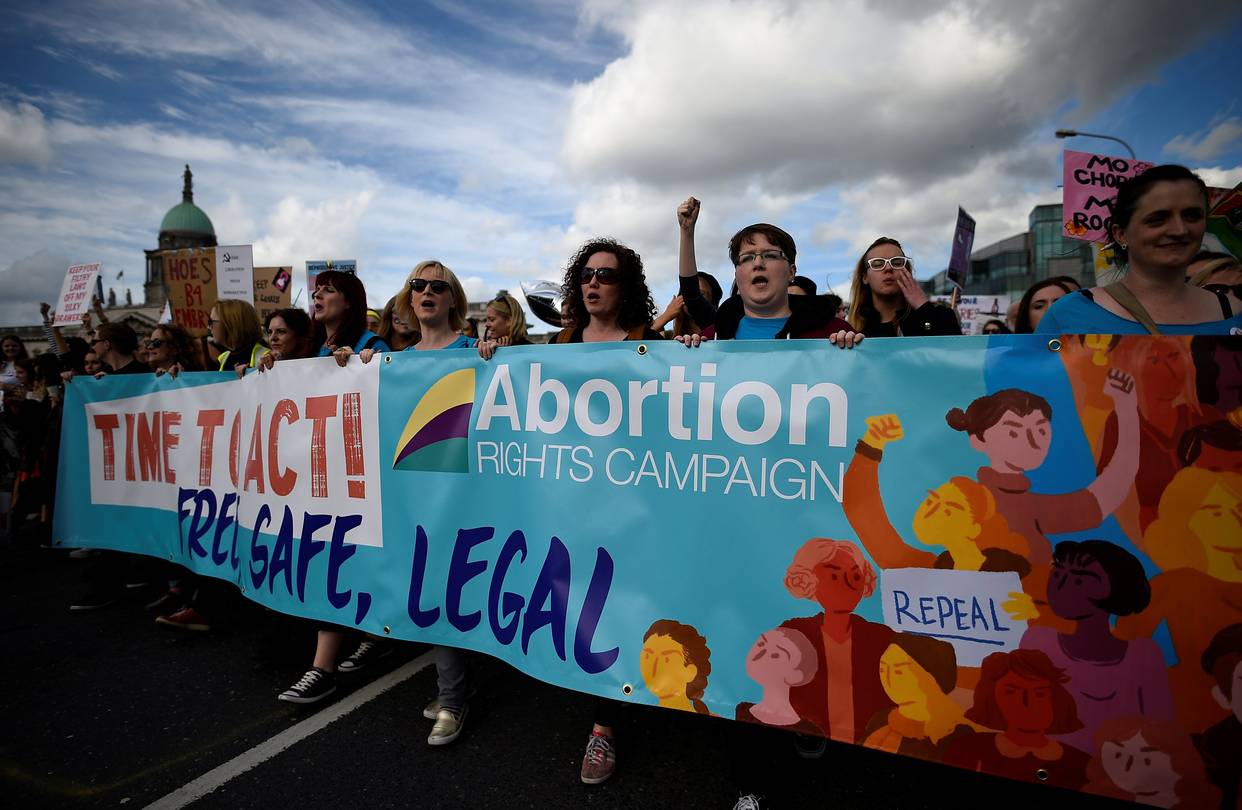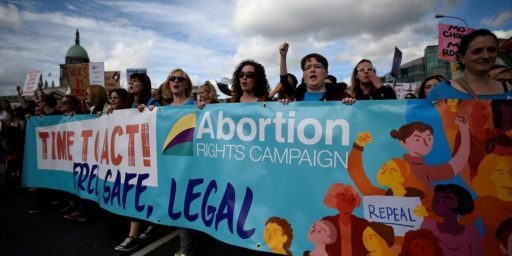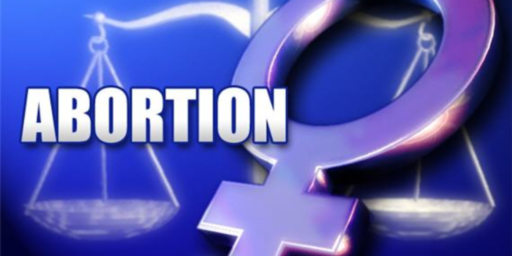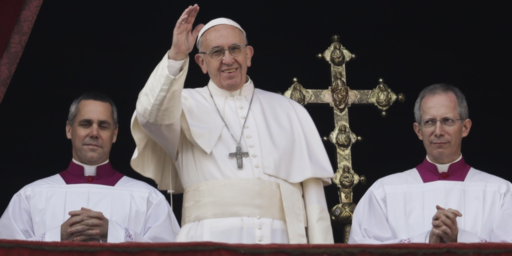Irish Voters Overwhelmingly Vote To Repeal Ban On Abortion
Just as they did three years ago when they legalized same-sex marriage, Irish voters turned out in record numbers to repeal the nation's ban on abortion.

Irish voters have overwhelmingly voted to repeal the Eighth Amendment to the nation’s Constitution, which bans abortion under essentially all circumstances in an outcome that was even more overwhelming than last-minute polling had indicated it would be:
DUBLIN — Ireland voted decisively to repeal one of the world’s more restrictive abortion bans, the prime minister said Saturday, sweeping aside generations of conservative patriarchy and dealing the latest in a series of stinging rebukes to the Roman Catholic Church.
The surprising landslide cemented the nation’s liberal shift at a time when right-wing populism is on the rise in Europe and the Trump administration is imposing curbs on abortion rights in the United States. In the past three years alone, Ireland has installed a gay man as prime minister and has voted in another referendum to allow same-sex marriage.
But this was a particularly wrenching issue for Irish voters, even for supporters of the measure. And it was not clear until the end that the momentum toward socially liberal policies would be powerful enough to sweep away the deeply ingrained opposition to abortion.
“What we have seen today really is a culmination of a quiet revolution that’s been taking place in Ireland for the past 10 or 20 years,” Prime Minister Leo Varadkar said at a counting center in Dublin hours before the results of Friday’s vote were fully tallied.
“This has been a great exercise in democracy,” Mr. Varadkar said, “and the people have spoken and the people have said: We want a modern constitution for a modern country, and that we trust women and that we respect them to make the right decisions and the rights choices about their own health care.”
With 80 percent of the vote counted, the “yes” camp had 67.6 percent of the vote, according to RTE, the national public broadcaster.
The deputy chairwoman of one of Ireland’s biggest anti-abortion groups, Cora Sherlock, called it a “sad day for Ireland” and rejected the argument that abortion was primarily a health care issue.
More from The Washington Post:
DUBLIN, Ireland — The Irish are poised to end in a landslide one of the most restrictive abortion bans in the developed world, according to tallies of votes cast in Friday’s referendum.
With ballots from 21 of 40 constituencies counted and turnout at an historic high, results so far show that 67 percent voted to overturn Ireland’s abortion ban and 33 percent opposed the measure.
The vote count on Saturday mirrored the results of two respected exit polls, which suggested a decisive win for the campaign to repeal the Eighth Amendment to the Irish constitution. The 1983 amendment enshrined an “equal right to life” for mothers and “the unborn” and outlawed almost all abortions — even in cases of rape, incest, fatal fetal abnormality or risk to maternal health.
“What we have seen today is a culmination of a quiet revolution that has been taking place in Ireland for the past 10 or 20 years,” said Prime Minister Leo Varadkar.
With half the constituencies counted, turnout was a record-breaking 65 percent — the highest ever for a referendum vote. By comparison, turnout was just over 60 percent when Ireland voted to legalize same-sex marriage in 2015.
(…)
The exit polls released by Irish broadcaster RTE and another from the Irish Times saw two-thirds of the vote going to repeal. Women outpolled men in the exits, but men still supported the yes side. So did farmers and rural counties. Support was largest among the young and urban.
Irish Times columnist Finan O’Toole tweeted: “For all the attempts to divide us into tribes, the exit poll shows that every part of Ireland has voted in broadly the same way, which is to trust women and make them fully equal citizens.”
The tally of the vote began at 9 a.m. Saturday, with a final count expected by late afternoon or early evening. About 3.3 million Irish had registered to vote, and many appeared to be returning from abroad to cast ballots.
When polls closed late yesterday evening, an exit poll from the Irish Times had indicated that the “Yes” vote in favor of repeal was headed for a win with more than 60% of the vote, and the official count largely tracks the outcome of that survey. Prior to yesterday, though, pre-referendum polling had shown that the margin between “Yes” and “No” was tighter, and both sides had spent at least last month vigorously campaigning. While it seemed clear from the start that “Yes” had a distinct advantage in metropolitan areas such as Dublin, neither side seemed to be entirely sure about where the rural parts of the country would come down on this issue. While Ireland has become more secular in recent years, these rural areas tend to be more conservative and in many cases more closely tied to the Catholic Church than voters in urban and suburban areas. As it turned out, though, the vote for “Yes” appears to have been as overwhelming in those areas as it was in the areas around cities such as Dublin and Limerick.
This vote, of course, comes nearly three years to the day after Irish voters overwhelmingly voted to legalize same-sex marriage. In addition to reflecting the growing acceptance of gay and lesbian relationships in the western world, that vote was seen as a sign of how the culture in Ireland had changed, specifically with regard to the influence of the Catholic Church, which traditionally had been hugely influential as both a cultural and political force. In some respects, those changes have happened because, like much of Europe, Ireland has become far more secular than it used to be, especially among the younger generations. Partly, one supposes, these changes can be attributed to the greater freedom of movement that Irish membership in the European Union has brought about and the ease with which Irish young men and women can move between Ireland and other parts of the E.U. where the influence of religion on politics has been on the decline for decades now. In addition, though, it seems clear that the Irish Catholic Church has brought about much of this itself due to the revelations that have come out over the past decade or more regarding the same type of child abuse that has become public here in the United States as well as revelations regarding abuse of children at orphanages operated by the Catholic Church. These revelations, along with the aforementioned cultural changes, have drastically reduced the influence and reputation of the Church in Irish society. Notwithstanding all of that, though, the outcome of tomorrow’s referendum remains very much up in the air as noted above. The results of that change can be seen in the 2015 marriage referendum and the results of this vote.
With the Eighth Amendment repealed, the next step would be for the Irish parliament to pass legislation creating new laws to govern abortion in the country. Most likely, what we’ll see will mirror the state of the law in the rest of Western Europe, where abortion is largely permissible for any reason in the early stages of pregnancy but more tightly regulated later in pregnancy. Under the bill that the current Irish government has ready to be introduced pending certification of the results of this referendum. That bill would allow abortion on demand up to the 12th week of pregnancy, although it would require a waiting period of three days following an initial medical consultation. Between the 12th and 24th weeks of pregnancy, abortion would be permitted if the pregnancy was a threat to the life or health of the mother. After 24 weeks, it would be largely banned. While this proposal is more stringent than laws here in the United States, it is largely similar to existing laws elsewhere in Europe.
While one can argue that this new law is far from ideal, it’s certainly better than the situation Irish women have faced ever since the Eighth Amendment became part of the Irish Constitution. Under that regime, it’s estimated that some 170,000 Irish women have traveled to other parts of Europe, most especially the United Kingdom, to obtain an abortion. While that travel has become far easier thanks both to the ease of movement under the E.U. and the rise of discount airlines that make travel within Europe more affordable than it used to be. Nonetheless, there have been countless numbers of Irish women and girls who were unable to make that kind of trip and many who have died or suffered serious injury because of Ireland’s insanely restrivtive abortion laws. The Irish population has voted to change that, though, and that’s a good thing.






The usual suspect over at TAC is going ape over this result, as expected.
Over the last few years there have been truly shocking revelations about misdeeds by officials of the Roman Catholic Church in Ireland. Abuse of children, cover-ups of that abuse, the Magdalene laundries, and other scandals have shaken Ireland. I see these votes as not reflecting seduction of the populace by secular leftist cabals but as reactions to wrongs done under the cover of “faith.”
I will say that my favorite nation does not have an official religion and actually proscribes the establishment of religion its foundational law.
@Slugger: Here is someone more eloquent than I am:
https://www.youtube.com/watch?v=ATaFyIbd5hY
@Grumpy realist: Well, thanks for that referral. I just love an occasional dip in Rod’s angst. It feels so good when the exemplars of that point of view are mourning.
@JohnMcC: If one were to follow TAC’s Usual Suspect, 99% of evil on Earth has been caused by the hippies’ Free Love movement and the acceptance of gay marriage.
@grumpy realist:
You forgot The Enlightenment and SJWs.